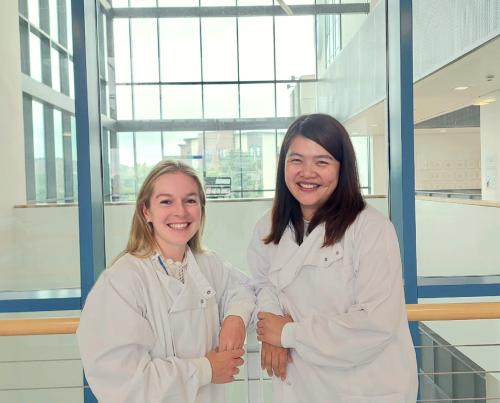
Abigail Brewer, a recently graduated PhD student, and Jin-Feng Zhao, a postdoctoral researcher, from Prof. Gopal Sapkota’s lab at the MRC Protein Phosphorylation and Ubiquitylation Unit have been awarded the 2024 Howard Elder prize for their exceptional cancer discoveries on targeted dephosphorylation.
The annual Howard Elder prize was endowed by Dr Alison Burt in memory of her father (Dr Howard Elder, a former medical graduate of the University of Dundee) 39 years ago and recognises outstanding work in the field of cancer research.
In a remarkable advancement for rewiring cellular signalling, Abigail and Jin-Feng have developed a novel approach to precisely control the levels of protein phosphorylation. Protein phosphorylation is employed as a crucial regulatory mechanism by cells and its dysregulation has been implicated in various diseases, including numerous cancers. Indeed, dysregulation of the phosphorylation of SMAD3, a protein involved in transforming growth factor β (TGF-β) signalling, can contribute to tumour progression by promoting EMT (epithelial to mesenchymal transition).
Traditional methods to control protein phosphorylation include protein kinase inhibitors and hundreds are currently in clinal use. However, they have significant limitations, such as lack of specificity and broad substrate effects, potentially leading to many side-effects, and emergence of resistance. Precise substrate-level phospho-control is therefore a desirable goal, but one that is very challenging.
In complementary studies, Brewer et al. (https://pubmed.ncbi.nlm.nih.gov/39104417/) and Zhao et al. (https://pubmed.ncbi.nlm.nih.gov/39081292/) specifically address this challenge by developing and employing a novel small molecule, named BDPIC (bromoTAG-dTAG proximity-inducing chimera). In this research, BDPIC was leveraged to recruit phosphatase enzymes to phosphorylated target proteins (SMAD3 and TFEB) inside cells to effectuate removal of phosphate moieties from the target proteins. This “targeted dephosphorylation” was achieved for SMAD3 and resulted in inhibition of TGFβ-induced gene transcription and epithelial to mesenchymal transition (EMT), a process that is a key step in cancer metastasis. Targeting dephosphorylation of TFEB, a transcription factor that regulates lysosomal function and autophagy in response to stressors, resulted in TFEB nuclear translocation and altered transcription of some of its target genes, even in the absence of stressors.
The award judging panel commented “These exciting studies establish proof-of-concept for targeted dephosphorylation to modify protein function, potentially offering a novel modality to tackle key phospho-proteins involved in cancer progression and drug resistance”.
Prof. Sapkota added, “This is a tremendous achievement by Abbie and Jin-Feng, who have demonstrated the utility of BDPIC to target dephosphorylation of intracellular proteins by recruiting protein phosphatases. BDPIC also offers a transformative approach to recruit any two proteins inside cells into proximity for purposes beyond just targeted dephosphorylation.” He commented, “we are excited to apply this further to determine if targeted modulation of proteins of interest via induced-proximity to protein-modifying enzymes offer new therapeutic approaches.”
For these remarkable contributions, Abigail and Jin-Feng have been awarded the Howard Elder Prize 2024. We are excited to hear about the future success of the targeted dephosphorylation modality in tackling cancer and of BDPIC in targeting alteration of more protein post-translational modification

